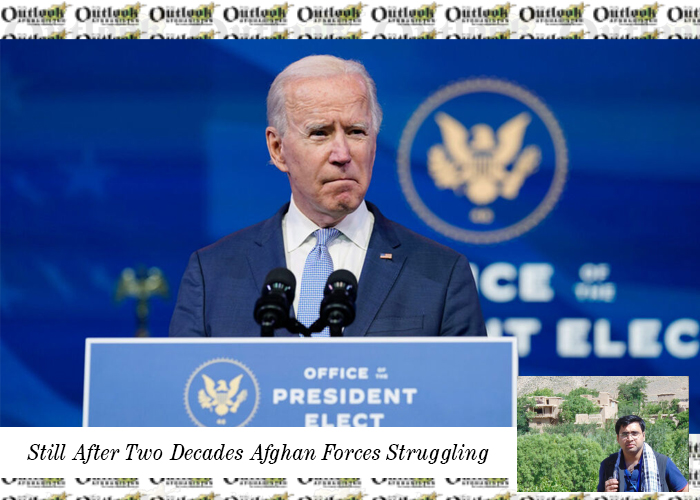US President Joe Biden has announced plans to pull out all United States troops from Afghanistan by September 11, ending the longest war in American history. In Kabul, many fear that Afghan security forces won’t be able to defend the country or even big cities if the Taliban choose to march on after the US pullout. According to a report published by Council on Foreign Research (CFR) last month. The Taliban is much stronger now than at any point since it was ousted in 2001. Currently, Taliban forces number up to eighty-five thousand full-time fighters. Also, it controls one-fifth of the country and continues to launch attacks. But a valid question needs to be answered by the Afghan government as to why its numerically superior and more resourceful forces are not able to hold the Taliban. The US has spent around $88 billion on Afghan security forces since 2001 but still, they are struggling hard. Afghan government deliberately doesn’t want to answer this question as it will reveal its own shortcomings. Kabul administration has the best excuse which is its all-time favorite that it’s fighting a war imposed on it by its neighbors or regional powers. But by always making this excuse Afghan government can’t escape from its responsibility.
It is not that Afghan security forces are not brave enough in fact with poor leadership low-level officers and soldiers have shown tremendous courage to fight. But it is the flawed policies and mismanagement of the Afghan government which hasn’t allowed Afghan forces to become formidable foe for Taliban. Let’s have a look at some factors responsible for the weakening of Kabul forces.
Weak Intelligence- Afghan forces require a robust intelligence collection and targeting capability if they want to turn back the tide of a reinvigorated Taliban insurgency. Afghanistan intelligence agency i.e. National Directorate of Security (NDS) not only suffers from an inability to share and disseminate actionable intelligence, but also is plagued by the controversy of favoritism and nepotism and its ethnic composition dominated by Panjshiris Tajiks from Panjshir a group affiliated with the former Northern Alliance. The NDS ethnic composition poses challenges to the intelligence agency’s ability to infiltrate the Pashtun groups most likely affiliated with the continued insurgency in Afghanistan. It is also an urgent need to increase more advanced voice intercept capabilities and cross-communication between the National Directorate of Security (NDS) and security forces in the field.
Corruption- Some of the analysts blame the impotence among the military apparatus on the established corruption in the institution. Public opinion and observers recognize the army as a deeply corrupt and inept organization, even lacking to provide enough food, ammunition, and proper clothing to its servicemen. Such ineptitude is said to be the main reason emboldening the Taliban to make advances against the government forces across the country and carry out fatal assaults against them and the public.
Sectarian composition of Armed Forces- The Tajiks occupy more top posts in comparison to their population against other ethnic groups. For example, the presence of the Hazaras and other ethnic groups are smaller in size compared to their population. Pashtuns are also included but a large number of Pashtun personnel are from the eastern areas of the country. Only a small number of the southern Pashtuns who make up an ideological and ethnic base of Taliban are included in the armed forces. Such an imbalance creates mistrust and misunderstanding among different sectarian groups towards the army, making it look like a foreign force.
No clear military Strategy- The country’s security apparatus as a complex lacks security and strategic analysts to lay the foundation of a combat policy ahead of the Afghan policymakers to press forward against the militants using a well-studied defense program. Rather than just focusing on responding to insurgent’s attack, Afghan military strategists should chalk out a proactive strategy that engages the enemy in their stronghold.
Highly Understaff- The Afghan National Army, which is meant to be the country’s backbone of the defense, and the National police, which tends to bear the brunt of Taliban attacks are operating at roughly 50 to 70 percent of their official maximum strength of 352,000, due to a combination of corruption, attrition, and difficulty finding replacements.
Unless some immediate corrective steps are not taken the Afghan security forces could meet the same fate as the previous Afghan army under former President Mohammed Najibullah. Which got disintegrated after the president’s downfall due to deep ethnic and factional divisions, the absence of good leadership, and declining financial and technical support from the Soviet Union. For fixing all the above issues which are weakening the country’s forces Afghans don’t need any outside help. It’s high time that Afghans should take charge of their home rather than just complaining as it’s a bitter truth that no one else will come to fix your country.
Home » Opinion » Still After Two Decades Afghan Forces Struggling
Still After Two Decades Afghan Forces Struggling
| Manish Rai

